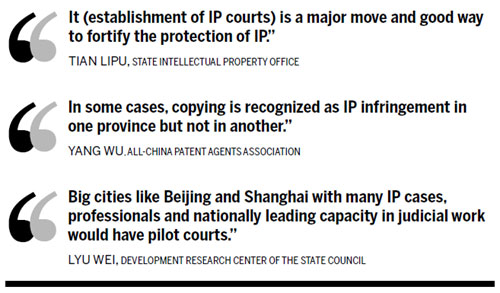Twenty years after the first intellectual property division was established in a court in China, now is the time to found courts dedicated solely to hearing IP issues, said law experts and industry insiders during the annual meetings of the nation's top decision making bodies.
"It is a major move and good way to fortify the protection of IP", Tian Lipu, former commissioner of State Intellectual Property Office, told Guangming Daily.
In 1993, the nation's first IP division at a court was established at the Beijing First Intermediate People's Court. There are now some 420 IP divisions and more than 2,700 IP judges in the nation's courts.
The new proposal comes as the number of IP-related lawsuits surge. Courts nationwide dealt with some 30,000 civil IP cases in 2009, but the number soared to nearly 90,000 last year. The number of criminal IP cases grew from about 3,600 to nearly 10,000 over the same period.
One feature of IP lawsuits is their close ties to technology, said Jiang Ying, an IP division judge at Beijing First Intermediate People's Court.
"Because of the expansion of traditional technologies and emerging new ones, we have to keep renewing our knowledge about all fields and professions," said Jiang.
Most IP lawsuits are about patents, trademarks and copyrights, but the disputes are scattered across civil, administrative and criminal divisions, which "leads to increased difficulties in hearing procedures because judges in different divisions may have discrepancies in their recognition of cases", said Jiang.
She cited trade secrets as an example.
"The criminal procedure usually has a lower standard than civil courts when identifying a trade secret," she explained. "So it is possible that the defendant is judged guilty for infringing on a trade secret in a criminal procedure, but found innocent in the civil process after that."
Without nationally constituted IP courts, another problem is local protectionism, said Yang Wu, chairman of the All-China Patent Agents Association.
"In some cases, copying is recognized as IP infringement in one province but not in another," he said.
"Some officials only consider local interests and ignore local IP infringement," said Li Jia, general manager of Zhonghao Chenguang Research Institute of Chemical Industry.
To address the unbalanced regional economic development in the country, he proposed establishment of a number of IP courts with strong professionalism to deal with cross-regional IP cases, which would be efficient in both material and human resources.
Another solution is local courts dedicated to IP issues, a concept first raised in the 1990s.
The first move to implement a system for hearing cases at the local court level was the IP division at the Shanghai Pudong New Area court.
In 1996 it became the first pilot IP division in a local court, responsible for all civil, administrative and criminal cases in the area involving IP.
The model has since been adopted in six high courts, 74 intermediate courts and 80 local courts.
Many cities, including Beijing, Shanghai, Chengdu, Nanjing and Zhengzhou, are now preparing to apply for the founding of full IP courts.
"We do not have to establish IP courts everywhere at the same time," said Lyu Wei, an official at the Development Research Center of the State Council. "Big cities like Beijing and Shanghai with many IP cases, professionals and nationally leading capacity in judicial work would have pilot courts."
But Xie Shanghua, deputy director of the Sichuan High People's Court, said an IP court in the provincial capital Chengdu would help integrate resources in the West China region.
zhangzhao@chinadaily.com.cn

(China Daily 03/12/2014 page17)

